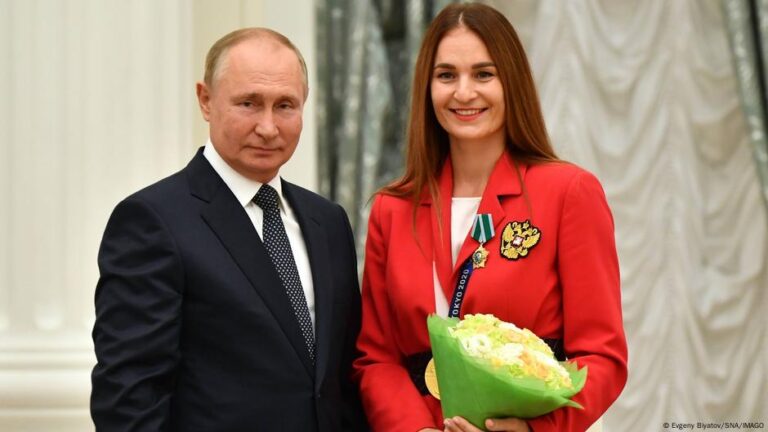Russians with direct links to the military will be free to compete at the world fencing championships in July after the sport’s governing body abandoned independent vetting of Russian and Belarusian athletes.
Under the International Fencing Federation’s (FIE) new neutrality policy, being affiliated with military clubs is no longer a disqualifying factor for fencers who wish to obtain neutral status.
That decision has allowed five-time Olympic medalist Sofya Velikaya, a major in the Russian army by virtue of her membership of the army club CSKA, to enter the 2025 world championships, which start in Tbilisi, Georgia, on July 22. Many sports organizations in Russia are connected to the army or the police.
Referring to Velikaya’s participation in Tbilisi, one senior European fencing official told DW: “That for me is a total no-go.” The official said they were “outraged” by the decision to scrap independent checks.
The move has also sparked anger in Ukraine, which is still heavily under attack from Russia.
“This is a slap in the face not only to Ukrainian athletes, but to the entire global sports community,” said Mykhailo Ilyashev, the president of the Ukrainian Fencing Federation. “We have emphasized from the very beginning that this whole process of testing Russian fencers for neutrality is a farce.”
Ukraine: Velikaya has no right to participate
Ukrainian sports officials have long campaigned against the participation of athletes from Russia and its ally Belarus in international events, even as neutrals.
From now on, the FIE will only require Russian and Belarusian fencers to sign a form confirming their neutrality, without any third-party oversight. The requirements include not making any public statements that support the war or participating in any pro-war rallies.
The policy, announced in a letter to the FIE’s member federations, breaks with one of the main neutrality rules imposed by the International Olympic Committee (IOC) at the 2024 Paris Olympics. There, any athlete who was “contracted to the Russian or Belarusian military or national security agencies” could not participate.
Velikaya, 40, missed out on the Paris Games because of her army status. She had never appeared on any vetted list of neutral athletes, and her inclusion at the world championships — alongside fellow CSKA members Yana Egorian and Olga Nikitina, who both also have military ranks — has shocked many observers.
In June, Ukraine complained after Velikaya was nominated as a candidate for the FIE’s athletes’ commission, highlighting her rank of major and her role as an official campaigner for — “a confidante of” — Russian President Vladimir Putin in the 2024 presidential election.
“Such a person cannot be recognized as neutral and has no right to participate in the international sports movement — and even less to claim to represent the interests of athletes around the world,” Ukraine’s Sports Ministry wrote in a joint statement with the Ukrainian Olympic Committee and Ukrainian Fencing Federation.
The ministry charged that “aggressor countries are using sport not for dialogue and unity, but as a tool of propaganda.”
‘Burdensome and particularly costly’
Previously, similar to many international sports federations, the FIE hired a cybersecurity company and independent lawyer to verify information that it had collected on Russian and Belarusian fencers who applied for neutral status. At that time, the criteria for granting this was in line with the IOC’s rules.
Explaining its decision in the letter on July 7, the FIE called the vetting process “burdensome and particularly costly,” and said it wanted to “simplify the process, to make it quicker and less expensive.”
It is the second time in three months that the FIE has gone against the IOC, having decided in April to allow teams of neutral athletes at its events, something that was not permitted in Paris.
Asked by DW to comment on the FIE’s diverging policies, the IOC replied that each sport’s governing body “is the sole authority for its international competitions, outside of the Olympic Games.”
The FIE didn’t respond to a request for comment.
Is Russian billionaire pulling strings?
Observers say fencing has long been under Russia’s influence.
In March 2023, the sport was one of the first to readmit Russians and Belarusians as neutrals.
In November, Russian billionaire Alisher Usmanov — once described by the European Union as “one of Vladimir Putin’s favorite oligarchs” — was reelected as the FIE’s president for a fifth term, despite being sanctioned in nearly 40 countries.
Usmanov, who rejects the term “oligarch,” singlehandedly bankrolled fencing for years. He stood down from the presidency just days after his reelection, although many inside the sport suspect that he is continuing to pull strings from behind the scenes.
Another fencing source told DW that Usmanov’s influence was “obvious,” but pinned most of the blame on the FIE’s executive committee.
“Recent decisions to return fencers in teams, and in particular fencers with known and public military affiliation before, during and after the war is simply unacceptable while the IOC and wider sport world maintain appropriate restrictions on Russian and Belarusian participation,” the source said.
Edited by: Matt Pearson


